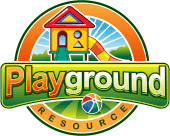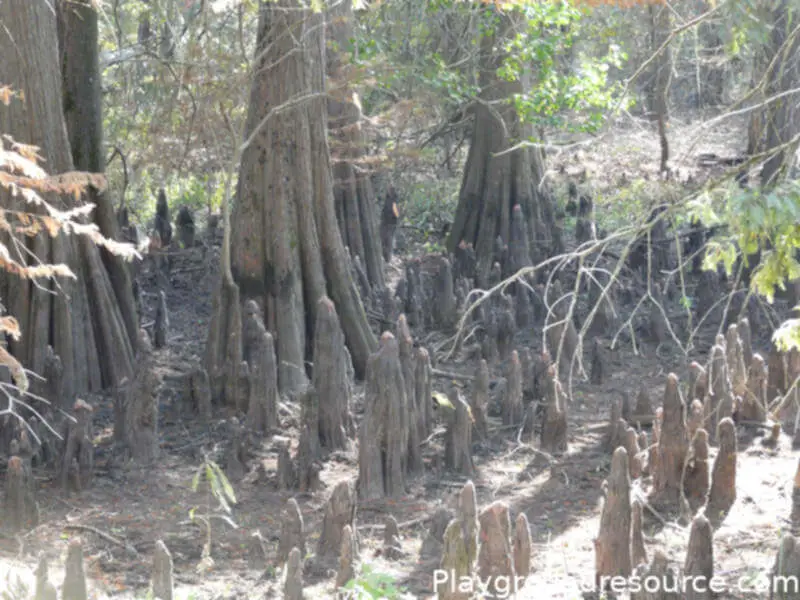
Today let’s talk about cypress mulch and using it as a ground cover for your playground area. Many different kinds of cypress mulch are available, and not all of them are good choices for your playground.
In this article I’ll cover everything from any safety and environmental concerns you may have, to cost and durability.
We’ll then take a look at the pros and cons of cypress mulch as a ground cover for your playground area.
Table of Contents
Is Cypress Mulch Good for Playgrounds?
Cypress Mulch can be a good, natural ground cover to use in your playground area. As well as being attractive, cypress mulch is also resistant to decay and has some insect repellant properties.
But cypress mulch also has some serious environmental drawbacks. Not all cypress mulches that are sold are the same, and cypress mulch is actually banned in some areas of the U.S.
Why Cypress Mulch is Banned in Some Areas of The U.S.
Of the more than 12 species of Cypress trees that grow in North America the Bald Cypress and Pond Cypress are most commonly used to make mulch.
These trees grow mostly in the lowlands and swamps of Florida and Louisiana and are a very important part of the ecological system. Wildlife and fish depend upon these trees to provide shelter and nesting places and to maintain a natural habitat.
The roots of these cypress trees also help to filter the water in the low lying areas where they grow making it important not only to the fish and wildlife that inhabit the area, but to all living things.
It takes both the Bald Cypress and Pond Cypress trees over 30 years each to reach maturity, and since these trees are difficult to grow by seed, they are being harvested much faster than they can be regrown, putting the whole ecosystem in danger.
Harvesting the large mature trees forces wildlife to leave that area to find alternative places to live. That along with the residual damage of logging is why cypress mulch is banned in parts of Florida and Louisiana. Harvesting these mature trees is prohibited in those areas.
Not All Cypress Mulches are the Same
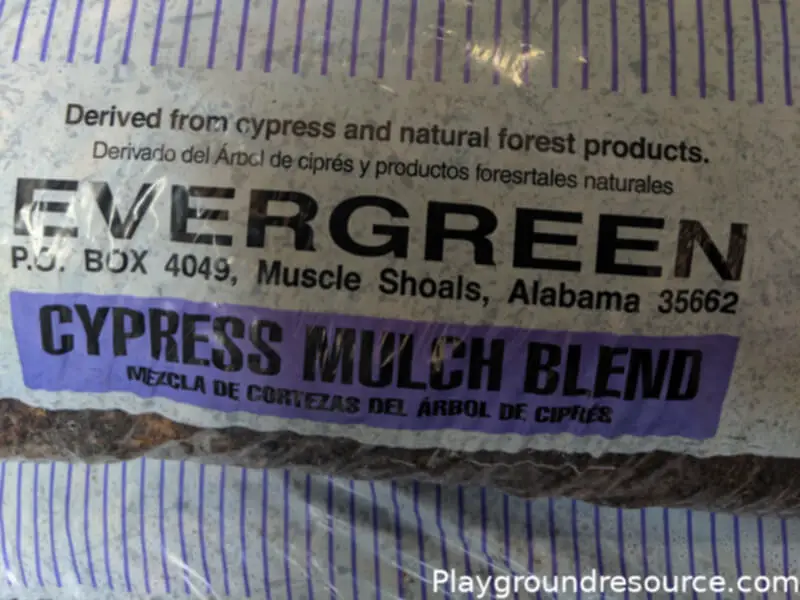
When buying cypress mulch in bulk, examine the mulch carefully. Due to restrictions on harvesting cypress trees in some areas, small young trees are harvested instead.
These small trees do not have the same insect repellant and slow rot qualities of the larger more mature trees due to the immature quality and lower amount of natural oils.
If the mulch has a large percentage of bark, it is probably the smaller cypress trees that were used to make the mulch. Buying the small cypress tree mulch is really defeating the purpose of using cypress mulch because costs are the same but the benefits are less.
Cypress wood chips last longer than the cypress landscaping mulch because the chips are larger and slower to deteriorate over time.
When buying bags of cypress mulch from your local hardware store you also have to pay close attention to what you are getting.
Many of these products are labeled “Cypress Mulch Blend” and contain other woods, which defeats the purpose of buying cypress mulch. Another popular label is “No Float Mulch“, this product is shredded more finely than other mulch or wood chip products helping it to “weave” together and not float away.
Again, this is usually not 100% cypress unless specified, so be sure to read the fine print. I was able to find a brand that’s available at Lowe’s and Home Depot called “Estate Cypress” and is made from 96% pure cypress wood. No matter what brand you buy, be sure the mulch is untreated and undyed.
Is Cypress Mulch Safe for Your Playground Area?
As long as the product is made from 100% virgin wood and guaranteed free of pesticides or other harmful chemicals, it is a natural and safe ground cover for your playground.
The natural oils in cypress repel water and harmful insects such as cockroaches, termites, and certain ants. Once the cypress ages and dries out, it tends to absorb water and lose some it’s decay and insect resistant qualities.
Pros and Cons of Cypress Mulch
Pros
- Long-lasting – Average re-application is between 2 and 5 years depending on the thickness of the wood (remember, cypress wood chips last longer than cypress shredded mulch)
- Attractive – A beautiful, natural appearance with a deep blond and amber color. The beauty of this mulch is one of the main reasons it’s so popular
- Insect resistant – Cypress is naturally insect resistant if mature trees are used to make the mulch, the natural oils and resins in the wood drive away harmful insects like termites
- Water resistant – Cypress is naturally water resistant and will not absorb water, making it slower to decay than many other wood mulches
Cons
- Bad for the environment – Harvesting cypress trees deplete the swamps and wetlands in the southern U.S. which is a habitat for wildlife and fish, which impacts our environment negatively
- Floats during heavy rains – Cypress wood is a light material which means you may have to install barriers to prevent your mulch from floating away, this is especially true when using cypress wood chips
- Not allowed in parts of the U.S. – Due to the negative environmental impact that harvesting Cypress trees have, parts of Florida and Louisiana do not allow its use. Environmentally-conscious individuals would be hesitant to choose cypress mulch
Alternatives to Cypress Mulch
If you have environmental or other concerns about using cypress mulch, I have some great alternatives for you.
Cedar Mulch
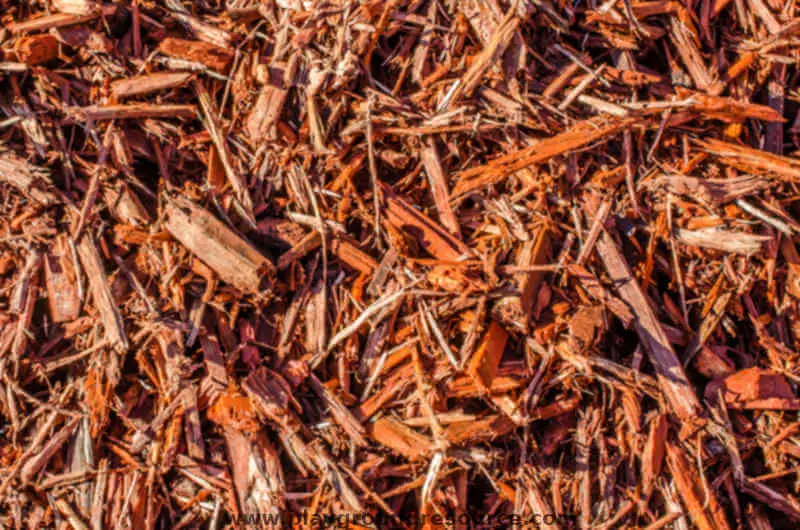
Cedar mulch is a great alternative and is superior to cypress mulch in many ways. Cedar wood has the same decay-resistant and insect resistant qualities that cypress mulch does – only better.
Cedar mulch can last over 10 years before rotting and having to be replaced. Cedar trees are also more abundant and cause less of a negative impact on the environment.
If you want to know more about cedar mulch for use in your playground area, you should read the article my son wrote titled, “Is Cedar Mulch Good for Playground – Cedar Mulch Review“.
Pea Gravel
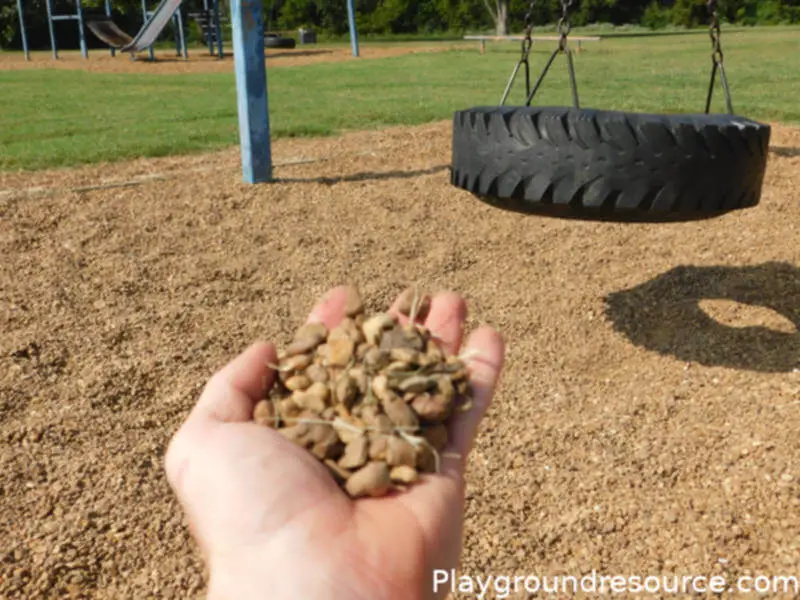
Pea Gravel is another great alternative to cypress mulch in your playground area. Natural, very long-lasting, and usually more affordable than cypress mulch, pea gravel also provides more fall protection than you may think.
Read my son’s article titled, “Backyard Playground Ground Cover – 5 Best Material to DIY“ for more information on pea gravel and other good alternatives to cypress mulch.
Engineered Wood Fiber (Playground Mulch)
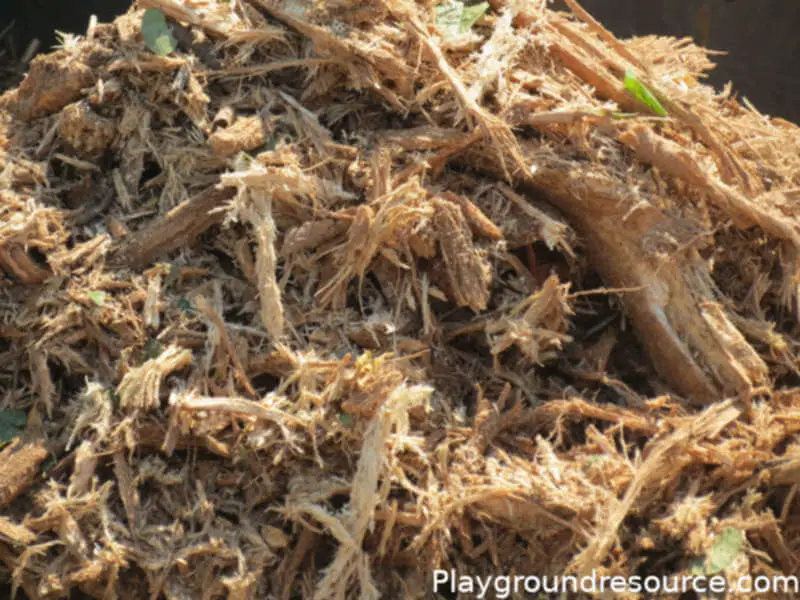
Made from hard and/or softwoods, this mulch is ground into a fibrous consistency, giving it a “springy” quality.
This material has the best fall rating of any other wood mulch and can be certified by IPEMA (International Playground Equipment Manufacturers Association) and ASTM (American Society for Testing and Materials).
To carry these certifications this material has to meet very high standards of quality and safety. If you’re interested in this popular playground mulch check-out our article titled “How is Playground Mulch Made – EWF Mulch Explained“.
Important Take-Aways and Final Thoughts
Some of the most attractive playgrounds are mulched with Cypress chips and/or mulch. It ages well, lasts longer than most other hardwood mulches, is water-resistant, insect resistant and priced moderately.
A better choice is Cedar playground mulch, which has all of the great qualities of Cypress, without the negative environmental impact. Cypress can definitely be a good choice for the playground, but it is not an environmentally sound choice.
I personally would choose Cedar over Cypress for playground mulch. It is my personal choice for wood mulch in the playground.
Whatever mulch you decide to use, I hope you have found this article helpful. Remember to stay safe and have fun!

Kathryn
Over 14 years in special education with a BA in psychology. I work daily with children of all kinds, with a special focus on childhood development and play using music and play equipment among other tools.
